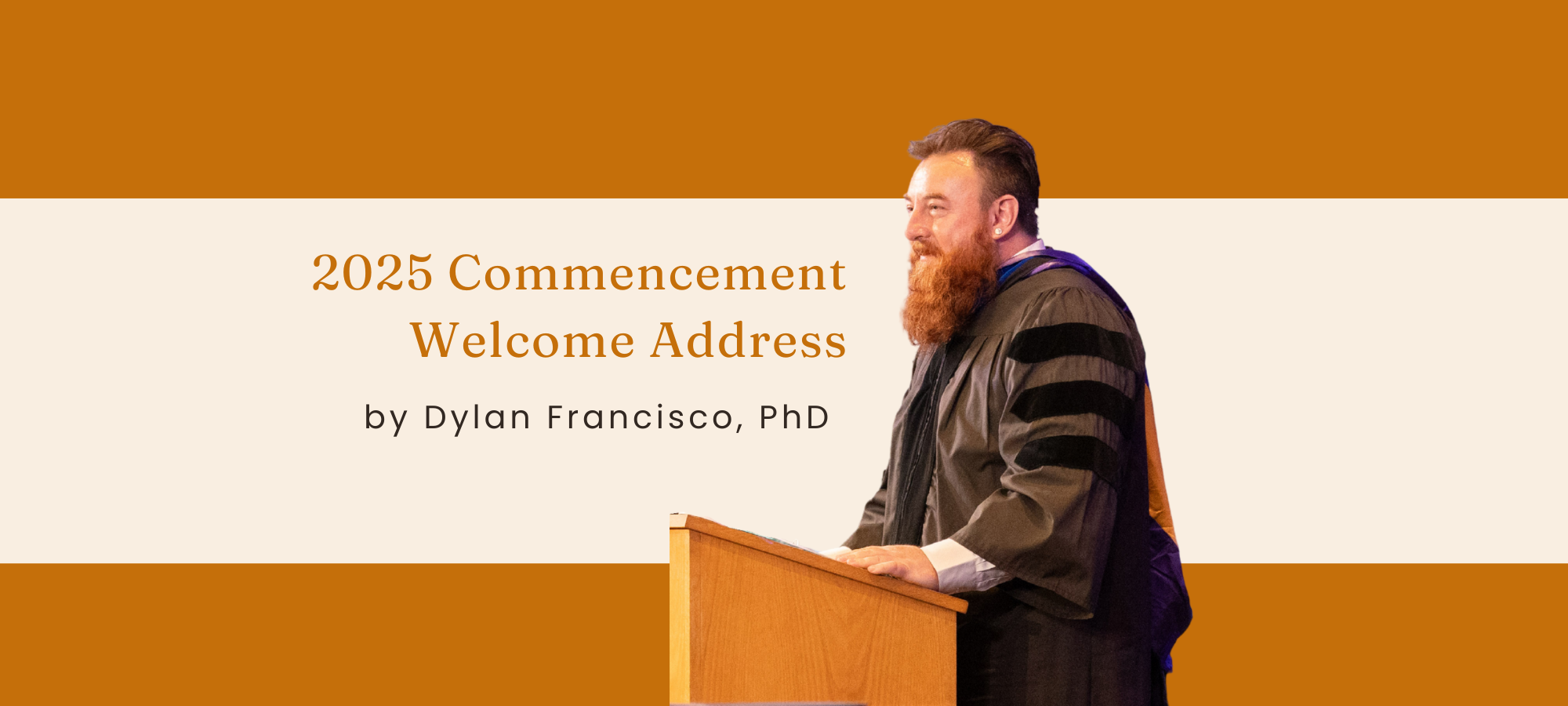Dylan Francisco, PhD, is Co-Chair of the M.A./Ph.D. in Depth Psychology with Specialization in Jungian and Archetypal Studies program. He gave the following 2025 Commencement Ceremony address for Pacifica. To learn more about the M.A./Ph.D. in Depth Psychology with Specialization in Jungian and Archetypal Studies (Hybrid-DJA & Fully Online-DJO) program, visit us here.
Hello everyone, welcome to the Commencement Ceremony for Pacifica Graduate Institute’s Graduating class of 2025. My name is Dylan Francisco, I am an assistant professor and co-chair of the Jungian and Archetypal Studies program and Faculty Special Advisor on the Executive Leadership Team here at Pacifica. I’m also a graduate of Pacifica. And I have the distinct honor of getting this rite of passage started.
That is why we’re here. But what brought us here? What brings someone to study at Pacifica Graduate Institute? If you’re a parent, spouse, relative, or friend of one of our graduate’s, you may still not be exactly sure what they’ve studied here. You’re not alone. When I told my mom I got accepted into a doctoral program, she was thrilled for me. And then she asked me what I would be studying. I said depth psychology. She said . . . oooohh, huh, what’s that?
I’m sure most, if not all, of our degree programs for all their differences and distinctions have elicited this response from someone.
So, before we get started, I want to take a few minutes to the “what’s that?” of Pacifica.
What is this “depth” we talk about here?
For us, “depth” is a guiding metaphor for our view that humans are more than they appear—and this “more” is below the surface, like a submerged iceberg, like a tree with extensive, invisible roots. The origins and sources of human motivation, behavior, and experience are rooted in a depth that exceeds what we’re aware of.
This, of course, doesn’t mean that we’re not interested in what is outwardly observable, only that we read what we observe differently, as the manifestation of more than what people think they are doing or saying. We build this view from the basic fact that humans don’t always or even often act the way they intend to. Something intervenes. We witness ourselves thinking or feeling things that surprise, sometimes scare, sometimes inspire us. Something different, more destructive and painful or more creative and beautiful, comes out of us than we wanted or expected or can even acknowledge.
This difference is the distinction we focus on here; that to understand what is going on within us and around us, requires attending to what emerges through these discrepancies between what we can see about ourselves and what our lives actually reveal.
I’ll use astrophysics to explain what I mean. Astrophysicists have had to come to terms with realities that cannot be seen or directly measured because the way light bends and galaxies move cannot be calculated based on the visible, material universe alone. Other things like dark matter and energy that are physically indetectable, have to be present to make sense of how the cosmos actually operates as a whole. Astrophysicists argue that 95% of the universe is the part we can’t see. That’s a lot to leave out if you’re not looking for it.
It’s the same for the psyche, the physically observable is only a small portion of its whole reality. We can’t put meaning or a sense for the sacred or creativity on a scale to see what they weigh, yet watch how humans tilt out of balance when these are left out. This is why our students study things as wide spanning as mythology, ecopsychology, creativity and the arts, indigenous traditions and history, religion and spirituality, politics and liberation psychology, culture and community psychology, philosophy and ideology.
We study the dark matter and energy of the psyche—in other words, its depths—the realities that don’t show up on a statistical graph or a brain scan, but without which we can have no true view of a whole human being.
Trust me, this is no small matter. And this is where I’ll end. Humans who are ignorant of their own depths, defining themselves only by what they can see, without reference to the invisible realities that make them whole, will perceive everything through the same reductive eyes, with no sensibility for the meaning and depth not just of other humans, but of the world itself.
The result of this myopic view is the world we see today, not of soulless humans in a dead and meaningless world, but of humans who no longer take the soul into their consideration, and so can treat everyone and everything soullessly. In our view, only a recovery of our sense of soul can address this, both because the soul makes humans whole and because whole humans are more sensitive and attentive to the presence of soul in everything. That is what we do here. We are the astrophysicists of psychology. Or as our motto puts it, we are here for the sake of tending the soul in and of the world.
To learn more about the M.A./Ph.D. in Depth Psychology with Specialization in Jungian and Archetypal Studies (Hybrid-DJA & Fully Online-DJO) program, visit us here.

Dylan Martinez Francisco, Ph.D. studied liberal arts at Georgetown University and psychology at Adelphi University before completing his Ph.D. in Depth Psychology at Pacifica Graduate Institute—concentrating in Jungian and Archetypal Studies. His work focuses on C. G. Jung’s theory of archetypes—on archetypes as the deepest nature of the psyche and how they interconnect spirit, psyche, and matter as numinous and mythic powers that animate, govern, and structure the cosmos as a whole. Dylan grounds his work in indigenous/shamanic perspectives and practices that provide a primordial, holistic, and sacred worldview within which to understand the archetypal psyche, to embody its wholeness individually, and to serve it culturally through creative imagination.


